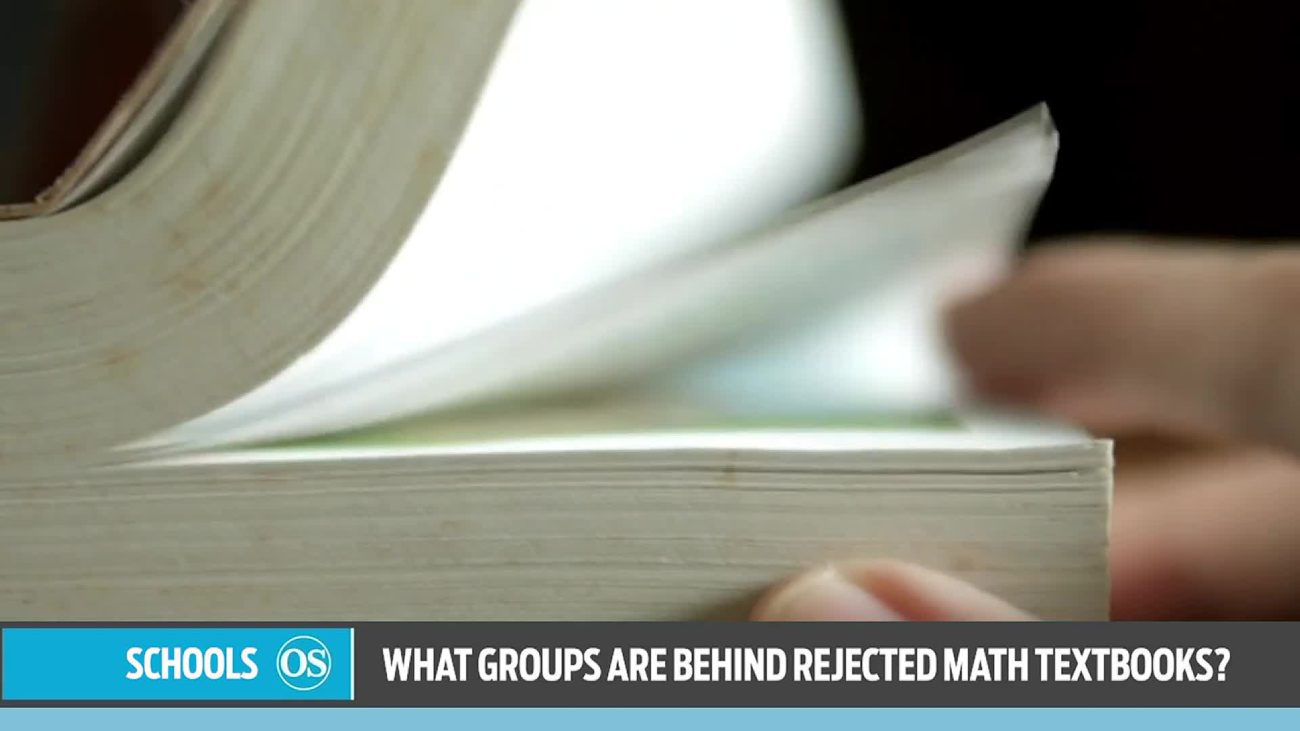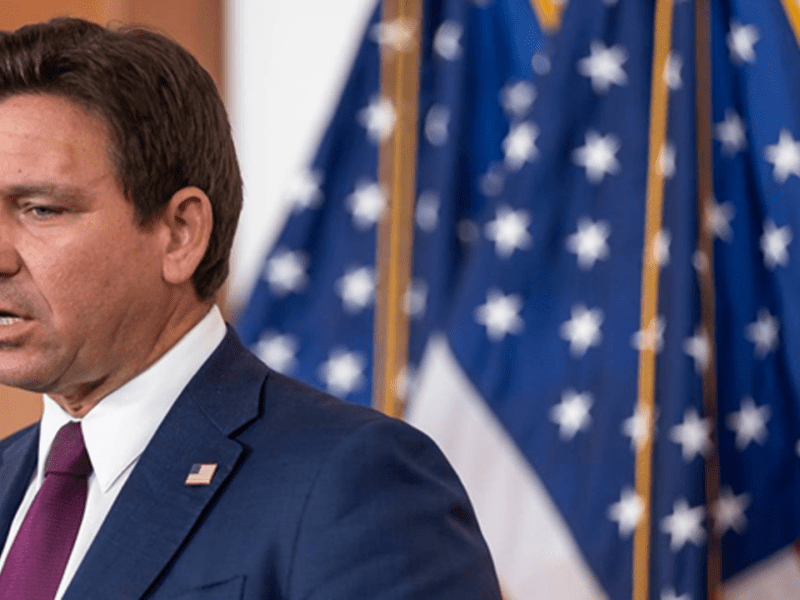Florida Citizens Alliance, other groups were ‘pulling the oars’ as state rejected math books
Orlando Sentinel | By Leslie Postal | May 12, 2022
In most Florida counties, school board hearings earlier this year on proposed math book purchases attracted little attention. In fact, across Central Florida, no one spoke against them.
But in some places, there were critics, among them a man who urged the Collier County School Board to use caution and to make sure the publisher it selected did not include “critical race theory” or other topics banned by the state.
That was Keith Flaugh, founder of the Florida Citizens Alliance. The group has been railing against school textbooks, claiming they wrongly taught evolution, “revisionist U.S. history” and “political and religious indoctrination,” for the past five years.
More recently, the alliance used its “porn in schools” report to push Florida school districts to pull books from their libraries. That made national news last month when a Panhandle school district announced it removed from its library shelves all books on the alliance list — and it was discovered the award-winning picture book “Everywhere Babies” was among the alliance’s 58 “objectionable” titles.
Flaugh, who served on the education advisory panel Gov. Ron DeSantis tapped after his election in 2018, took his concerns about math books to Tallahassee, too. He spoke with then Education Commissioner Richard Corcoran and Jacob Oliva, then Corcoran’s deputy for K-12 schools, he said, sharing his fears that textbook publishers would slip unwelcome lessons among the math problems.
:quality(70)/cloudfront-us-east-1.images.arcpublishing.com/tronc/SE6TEYSITBHRHNERPKOILINFKA.jpg)
He did not review the math books himself but argued the national textbook companies wanted to “tear down family values” with their left-leaning curricula. “When these woke companies have this stuff in their DNA how do you expect them to clean it up?” he said in an interview.
On April 15, the Florida Department of Education announced it had rejected 54 of 132 math books, “the most in Florida’s history,” claiming many aimed to “indoctrinate” children and expose them to “dangerous and divisive concepts,” such as critical race theory.
Since then, the department approved 20 of those books, saying publishers altered them to meet state standards or remove “woke content” and said that work continues. The department did not define what it meant by “woke” or provide specifics about what publishers did to fix their books.
Flaugh was pleased with the state’s action, although he does not take full credit.
“Others were pulling on the same oars,” he wrote in an email.
Many educators, however, including those who’d spent weeks reviewing the math books, were baffled. The rejected textbooks included the elementary math textbooks chosen by all Central Florida school districts and most of the state’s biggest school systems.
Many critics of the DeSantis administration viewed the announcement as pandering, especially when the state refused to provide specific examples of problems.
“This is most definitely a wolf whistle going out to extremist groups,” said Gregg Ross, a Brevard County father who appeared in an online press conference about the math book rejections with Democratic gubernatorial candidate Charlie Crist. “This is nothing more than a political stunt by DeSantis.”
:quality(70)/cloudfront-us-east-1.images.arcpublishing.com/tronc/KL4JGZDQQJGDTJIRAYAINP55GM.JPG)
‘Fringe, right-wing group’
Daniel Uhlfelder, a Democrat running for Florida attorney general, said he was disturbed the citizens alliance seemed to have so much influence over the DeSantis administration. “It appears to me that they are spearheading this whole education policy.”
The alliance is a “fringe, right-wing group,” with anti-LGBTQ views, he said, noting its website lists among its supporters the Florida Oath Keepers, some of whose members face charges of seditious conspiracy in connection with the 2021 U.S. Capitol insurrection.
The math book rejections are about “fake boogie men,” Ulhfelder said. “There’s no critical race theory in math.”
A lawyer known for dressing up as the grim reaper to criticize DeSantis’ handling of the COVID-19 pandemic, Uhlfelder learned about the group when the Walton County school district announced on April 22 it was pulling books the alliance flagged from its library shelves. He lives in that Panhandle county, and his children attend schools there.
He was stunned, he said, that the district would yank books from its libraries based on nothing more than an emailed report from Flaugh’s group. “This is un-American to remove books,” he said.
The alliance’s list included Toni Morrison’s Pulitzer Prize winning novel “Beloved” and books with LGBTQ themes or characters. Part of its mission, the report said, was to highlight the “LGBTQ agenda.” The report did not specify the problem with “Everywhere Babies” but lumped it under the headline, “Materials designed for Pre k and Elementary students are age inappropriate and hyper-sexualize children.”
The picture book, filled with drawings of babies in all sorts of families, includes one that shows two men walking down the street with their arms around each other, and another that depicts two women, fully dressed, collapsed asleep near a cradle with a sleeping baby.
In its news release about math books, the Florida Department of Education said that many of the rejected texts contained prohibited topics. It had earlier told publishers the books could not contain: “Critical race theory,” often called CRT, “social emotional learning,” or SEL, “culturally responsive teaching as it relates to CRT” and “social justice as it relates to CRT.”
Critical race theory, first proposed by legal scholars, says racism is embedded in the country’s institutions. Historically, the theory has been a graduate school subject. But DeSantis, who successfully pushed for a state law and rule to ban it, and other Republicans rallying against it say its tenets have seeped into K-12 classrooms with the aim to make white children feel guilty and to teach children to hate the United States.
The other topics are “tentacles” of CRT and aim to teach children everything “should be viewed through the prism of race,” Flaugh said. “We’ve been against social emotional learning from the beginning.”
Complaints about SEL
A Broward County mother who sent written comments to the school board there — the only person to complain about that county’s math textbook selections — shared similar concerns. Broward picked the same elementary math books as Orange and Seminole county schools.
Public schools should focus on basic math instruction, wrote Christine Speedy. “That means math problems, not lessons on inclusivity, geography, immigration, or worst of all, SEL embedded into the curriculum,” she said. “The math class curriculum is intentionally driven by SEL, which is an introduction into CRT.”
Critics of the state’s efforts, however, call those views nonsense and fear instead the state is pushing to whitewash history and prevent the teaching of tough topics such as slavery and the Jim Crow era.
They also note that many tenets of “social emotional learning” are required by the state, even if Florida avoids the SEL term. SEL is meant to help children manage emotions, set goals, show empathy for others and make responsible decisions, and many experts say children who have those skills do better academically.
:quality(70)/cloudfront-us-east-1.images.arcpublishing.com/tronc/QNODZP7MKJAEJK6HT6VUEMZ4CE.jpg)
The state’s new math standards — which must be implemented in August and prompted the need for new math books — tell teachers to “cultivate a community of growth mindset learners,” for example. The new law that bans CRT, the one DeSantis dubbed his “anti-woke” measure,” says children must learn “life skills that build confidence, support mental and emotional health, and enable students to overcome challenges.”
Raegan Miller, a Pinellas County mother who also spoke at the Crist press conference, said the textbook rejections stunned her.
“I honestly could not believe what I was hearing,” Miller said. “I reviewed the curriculum that was posted and thought it looked great.”
Miller said the math books did tell students to listen and think about others’ ideas, and she liked that. “I want my children to work collaboratively with others.”
:quality(70)/cloudfront-us-east-1.images.arcpublishing.com/tronc/USM4YJLVBNDCDEMSEGSMCWCOSI.jpg)
The skills the state requires are “borderline” to SEL, if not “hand in hand” with its concepts, and they are similar to character education standards Florida has required be taught for years, said Matthew Pelletier, a math coach for Polk County public schools.
“We’ve done essentially that for 20 or 30 years,” he added.
Confused by the state’s textbook rejections, Pelletier reviewed the books Polk picked for its elementary school classes — the same ones Lake and Osceola county schools selected — to see if he could find the prohibited topics.
“I went through our two textbooks front and back,” he said. “I could not find anything related to race or culture.”
Moms for Liberty weighs in
But Chris Allen, an Indian River mother, said she found plenty in two high school textbooks she reviewed. Allen is a member of Moms for Liberty, the conservative group whose members in the last year appeared alongside DeSantis at press conferences and celebrated in Tallahassee with Republican lawmakers when the “parental rights in education bill” — which critics dubbed “don’t say gay” — passed.
Allen reviewed textbooks selected by Indian River County and also volunteered to review two high school math books for the state. She was the only state reviewer who in written comments complained that she found CRT in the textbooks.
Allen said she sent her concerns to DeSantis and the education department. Among the issues she highlighted: A bar graph with the heading, “Measuring Racial Prejudice by Political Affiliation.” That book was for a high school class called “mathematics for college liberal arts.”
The department later released as examples of objectionable material two high school math problems she had sent, including the one with the graph. The graph “implies that people who consider themselves conservative are more likely to have racial prejudice. Thus turning off students from considering themselves ‘conservative’ now or in the future,” she wrote in her review.
:quality(70)/cloudfront-us-east-1.images.arcpublishing.com/tronc/YBY34NG2M5BZBKY2LJUDWHO6RA.jpg)
Stephana Ferrell, an Orange County mother and co-founder of the Florida Freedom to Read Project, said the mere mention of racism or the use of data on racism does not amount to teaching critical race theory.
There is “absolutely nothing wrong with how real world data on racism was used in a college level textbook,” she wrote in an email, after reviewing the books Allen dinged. “The fact that everyone in this country feels one way or another about our history and current status as a racist country makes a question like this very relevant.”
Flaugh doesn’t see it that way. The alliance recently posted on Twitter a clip of him on a Naples radio show talking about math books.
“I hear it from parents all the time. How can they screw up math? But it’s so easy for them to do so. In the math problems they’re stating the problems with content that pushes social emotional learning, equity … inclusion, race,” he said. “These companies are woke. The question is whether they will try to clean up their content.”






